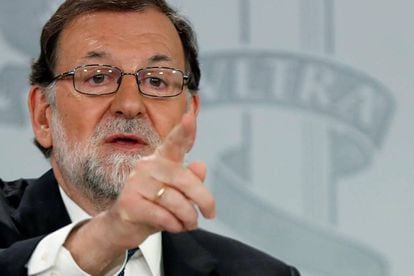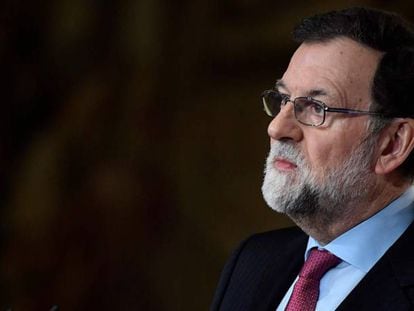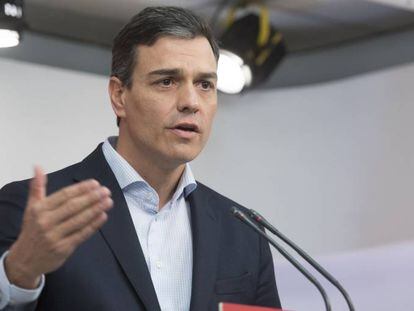Spanish Congress to debate no-confidence vote against PM this week
Session in parliament will start Thursday, but it is unclear how Socialist leader Pedro Sánchez will secure enough support to get Mariano Rajoy voted out

A no-confidence motion filed by Spain’s main opposition Socialist Party (PSOE) against Prime Minister Mariano Rajoy will be debated in Congress on Thursday and Friday.
The speaker in Congress, Ana Pastor, on Monday set the date for the debate for May 31 and June 1
The initiative is seeking to remove the Popular Party (PP) leader from office and replace him with Socialist secretary general Pedro Sánchez, who has pledged to call fresh elections “in a few months.”
Although the debate was initially expected to take place later in June, Speaker Ana Pastor said the first plenary session will be held on Thursday between 9am and 9pm, and a second one on Friday between 9am and 2.30pm.
“For the PSOE this is good news, and a chance to end a situation of institutional deterioration, to improve the quality of our democracy and to open up a new period,” said Socialist sources.
On Monday morning the governing body of Congress, the Mesa del Congreso, verified that the motion complied with procedural rules and referred the document to the prime minister, as well as the spokespeople for other political parties, who have two days to present alternative motions of their own if they so wish.
The motion comes on the heels of a court ruling finding former PP officials guilty of embezzlement, tax evasion and other crimes in a sweeping kickbacks-for-contracts case known as Gürtel. The PP itself has been slapped with a heavy fine after judges found that it had benefited financially from the corruption scheme, although the party itself never faced criminal charges.
While it is unclear how Sánchez will manage to secure the 176 votes required for the no-confidence motion to succeed – his party has 84 seats in Congress – the move is already creating cracks in the united front that the PP and PSOE had been presenting on the issue of Catalan independence.
Madrid continues to exercise direct rule over Catalonia under special emergency powers granted by Article 155 of the Constitution. This provision was meant to be lifted as soon as a new Catalan government took office, but the newly appointed premier, Quim Torra, has included jailed and self-exiled politicians in his cabinet lineup and Madrid is refusing to publish their names on the official gazette, effectively prolonging the deadlock.
Doing the math
Sánchez will have no trouble securing the backing of the leftist Unidos Podemos (67 seats) and the Valencia regional party Compromís (four). The one deputy for New Canaries is expected to jump on board as well, giving the Socialist leader 156 votes.
But Ciudadanos, the fourth-largest presence in Congress, will not be supporting the no-confidence vote. The center-right party is leading voter intention polls and it would rather see fresh elections held as soon as possible.
Sánchez says that he is open to accepting support from Catalan pro-independence parties to remove Rajoy from power
Ciudadanos Secretary General José Manuel Villegas said on Saturday that he is concerned about “the Frankenstein government” that could emerge from a Sánchez-led administration. “How are you going to apply Article 155 if you negotiate your appointment with Quim Torra’s party?” he asked.
Sánchez, who has openly backed the government in its handling of the Catalan crisis and criticized secessionist leaders, now says that he is open to accepting support from Catalan pro-independence parties to remove Rajoy from power. But he says he will not negotiate with them.
The Catalan Republican Left (ERC) and PDeCAT, the party of ousted Catalan leader Carles Puigdemont, together hold 17 seats in Spanish Congress. Catalan premier Torra, of PDeCAT, said on Sunday that his support will hinge on whether the PSOE expresses support for releasing Catalan politicians currently in pre-trial custody over charges of rebellion and misuse of public funds. Torra also demanded public support for the right to self-determination.
Basque support
Even then, Sánchez will still need the Basque Nationalist Party (PNV), whose five deputies last week helped Rajoy push the budget plan through Congress. And so far, this party seems ambivalent about the no-confidence vote.
“I think Sánchez has rushed into this,” said PNV president Andoni Ortuzar in statements to El Diario Vasco on Sunday. “He should have mulled it over a little longer.”
The Basque nationalists do not want to be viewed as Rajoy’s saviors, and are willing to consider the no-confidence vote, but “we want to know what his commitments to the Basque agenda are, and to other things that we have been pledging to in recent times.”
Also, the PNV does not want the Socialists to call early elections now because it might give a victory to Ciudadanos, which is the only party that has openly questioned the Basque Country’s special financing deal, known as the Cupo Vasco.
“The PNV’s position, for now, is neither yes nor no.”
English version by Susana Urra and Simon Hunter.












































